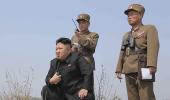North Korea on Wednesday claimed that it has successfully conducted the test of a hydrogen bomb.
If these reports are true, it means that it possesses something much more powerful than it has tested in the past. North Korea has run nuclear tests in the pasts, but this announcement has sent panic waves internationally.
And this could be the reason why:

The basic difference between an atomic and a Hydorgen bomb
An atomic bomb breaks up very large atoms (Uranium or Plutonium) into smaller ones, and thus, creating a super-critical chain reaction, resulting into a massive release of energy. This process is called fission.
To give you an idea of how much power, the atomic bombs dropped on the twin Japanese cities of Hiroshima and Nagasaki in 1945 killed close to 3 lakh people.
On the other hand, a Hydrogen bomb uses fusion. This essentially means that instead of breaking up large atoms, it combines smaller atoms to release a bigger nuclear punch. But to trigger that, you would need an atomic bomb.
So essentially, a Hydrogen bomb is two bombs into one, because it includes an atomic bomb inside the core. And the two explosions are simultaneous, and hence, the energy released is hundreds of times more powerful.
How far is North Korea's reach?
See for yourself:

So yeah, if true, there is certainly more than one reason for panic.

Why on earth would North Korea do such a thing?
Normally, an answer such as ‘because it is ‘supreme leader’ leader Kim Jong Un’s birthday on January 8, and this is an early gift for him’ would suffice.
But on a serious note, Kim Jong Un had claimed last in December that his country had become a ‘powerful nuclear weapons state ready to detonate a hydrogen bomb’ -- although the claim was greeted with scepticism by international experts.
"As long as the vicious anti-North policy of the US persists, we will never stop development of our nuclear programme," a report had said.
The test is the second since Kim Jong Un became ‘supreme leader’ and began consolidating power through a series of purges and provocations against South Korea.

So…is there a need for worry?
If North Korea indeed has developed such a bomb, the international worry is pretty legitimate. The country did its first known nuclear test in 2006, and has done two more since.
The test was conducted at the Punggye-ri underground test site in the far northeast, according to a news report. The explosion was first detected as a magnitude 5.1 earthquake by the US Geological Survey.
But it would still be a few more days to confirm if indeed North Korea has successfully tested a Hydrogen bomb.
Just how many nuclear weapons does the world have?
All estimates are approximate, but these are the latest figures according to the Stockholm International Peace Research Institute (SIPRI).

Text and infographics: Shubir Rishi









